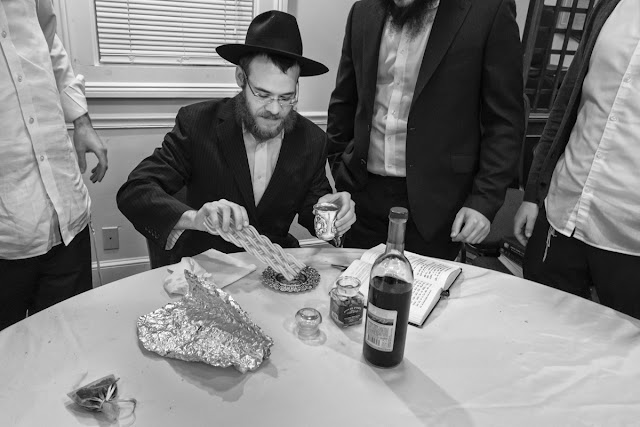The weekly celebration of the Jewish sabbath that occurs on the seventh day of the week is bookended by rituals that mark the specialness of the day that is devoted to rest from physical work, detachment from the material world, and a deep immersion into the spiritual connection with G-d through prayer and reading the Torah. At the beginning of the day - which begins at sundown on Friday evening - the Shabbos candles are lit (a beautiful ritual that I've previously presented), special prayers called Kabbalat Shabbat, and of course a big meal to welcome the Sabbath 'Bride'. At the end of the day - one hour after sundown on Saturday - a special set of prayers and multi sensory rituals are observed to wish the sabbath farewell until next week. There are many interpretations of the significance of each of the rituals.
Saying some biblical verses over a brimming cup of wine signifies a week overflowing with blessing.
The lighting of a braided candle. After Adam and Eve ate from the Tree of Knowledge, the great light that had illuminated day and night faded away after the first Shabbat. G-d gave Adam the wisdom to create a flame from two stones, so during Havdalah a blessing is said to commemorate the giving of fire. It's customary to use a candle with braided wicks because the blessing mentions 'illuminations of fire'. Looking at the reflection of the candle in one's fingernails reminds us of the first time Adam and Eve used fire on the night following the first Shabbat of history. In order to recite the blessing on the candle, it must be sufficiently bright to be able to benefit from its light. If we can use its light to distinguish between the fingernails and the flesh, we know that the light is sufficient.
Smelling sweet spices (besamim) - usually cloves and/or myrtle. According to Kabbalah, of all the five senses, smell is the only one that impacts the soul, so to revive out souls which have been saddened by the departure of the Sabbath we smell the spices.
The final blessing over the wine is recited and the then drunk after which some of the wine is poured into a saucer. Then everyone will dip their pinkie into the spilled wine and brush their wine-stained fingers against their eyebrow to express their appreciation of the commandment and to brighten their eyes for the coming week.
Dousing the flame of the candle in wine from the saucer demonstrates that the candle was lit only for the purpose of the havdalah ritual.
The final blessing over the wine is recited and the then drunk after which some of the wine is poured into a saucer. Then everyone will dip their pinkie into the spilled wine and brush their wine-stained fingers against their eyebrow to express their appreciation of the commandment and to brighten their eyes for the coming week.
Dousing the flame of the candle in wine from the saucer demonstrates that the candle was lit only for the purpose of the havdalah ritual.






No comments:
Post a Comment